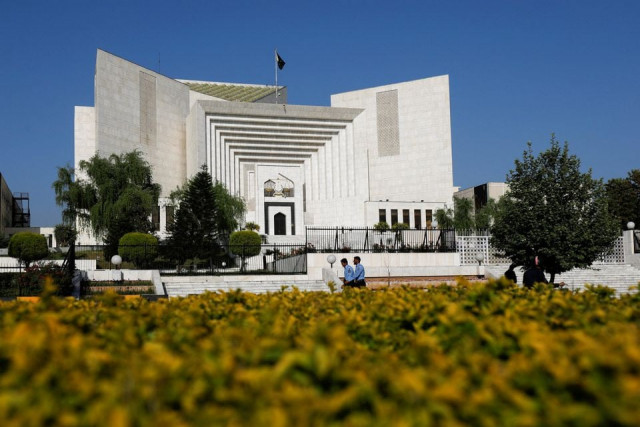All eyes on Supreme Court bench
Top court reserves ruling in pleas against review of judgments law

Once again all eyes are on a Supreme Court bench—comprising Chief Justice of Pakistan Umar Ata Bandial and two other like-minded judges—which on Monday reserved its ruling on petitions challenging the Supreme Court (Review of Judgements and Orders) Act, 2023.
The piece of legislation that widens the scope of review jurisdiction in cases decided under Article 184(3) of the Constitution was introduced by the coalition government, which has remained critical to the bench—also comprising Justice Ijazul Ahsan and Justice Munib Akhtar--since February.
In February, CJP Bandial took suo motu cognizance of a delay in announcement of elections for two provincial assemblies.
Even last year, the coalition government had expressed mistrust about the same bench when it set aside a ruling by former Punjab Assembly deputy speaker Dost Mazari. The ruling parties had requested these judges to form a full court to hear pleas against the ruling but the bench had turned down this request.
Subsequently, CJP Bandial in his speech on the eve of New Judicial Year last year complained that his nominations for elevation to the SC were not endorsed by the government representatives in Judicial Commission of Pakistan (JCP) on account of the bench’s decision in the Dost Mazari case.
Talking with reference to the case, a cabinet member said the federal government will win even if the bench strikes down the law, Supreme Court (Review of Judgements and Orders) Act, 2023.
“Its (government’s) political narrative will revive against these judges who are also hearing the Election Commission of Pakistan’s (ECP) review petition against its April 4 order to hold the Punjab Assembly's elections on May 14,” he said.
Read New legislation poised to draw judicial scrutiny
The cabinet member was responding to a query as to why the government did not raise an objection to composition of the bench in this case and why it did not request for formation of a full court as the opinion of these judges will affect other cases in which certain laws are challenged.
He said the bench has a good opportunity to end the perception that there is a hostility between the judiciary and the parliament. “When you are yourself welcoming the remedy provided in cases decided under Article 184 (3) of Constitution then there is no reason to strike down the law,” he added.
He said Attorney General for Pakistan (AGP) Mansoor Awan wisely suggested that in case of an alternative, they might read down the law rather than securing the legislation. Now the ball is in their court, he said. He also ruled out any back door deal with the judiciary on any issue.
Pakistan Tehreek-e-Insaf’s (PTI) counsel Ali Zafar is consistently arguing that the scope of review could be widened not through simple legislation but through a constitution amendment.
CJP Bandial and his fellow judges say the new law has merged the review with the appeal jurisdiction. The CJP said reason should have been given in the legislation for widening the scope of review petitions.
Referring to Article 187 of the Constitution, he said the effects of complete justice could have been incorporated in the relevant section of law to widen the scope of review. The bench also expressed some reservations on the manner in which legislation was done.
A law officer does not think that the bench will object to the parliament's competence to carry out legislation. Article 188 itself says that review jurisdiction can be regulated through a law.
He wondered if the review jurisdiction can be restricted through Supreme Court Rules 1980 then how it cannot be expanded through a law.
Former additional attorney general Tariq Mahmood Khokhar said not all judges accept a “Supreme Court” in the midst of the Supreme Court exercising power under Article 184(3) of the Constitution.
"Such power constitutes a “minoritarian” power. And there is no appeal against the exercise of such power. This cannot possibly be democratic nor judicious nor fair"
Khokhar said the Supreme Court’s Monday proceedings suggest a probable inclination to strike down the act or at least a significant part of it. He said the executive and legislative branches of the state feel they can gain the moral high ground whichever way the Supreme Court decides this case.
The Supreme Court judges are divided and CJP Bandial has included a majority of his like-minded judges in special benches.
This section of judges reflects a judicial mindset, which always gives a tough time to politicians. They also believe that the Constitution and not the parliament is supreme and the former is interpreted by them
The three judges hearing petitions against the Supreme Court (Review of Judgements and Orders) Act, 2023 are part of a special bench examining the legislation carried out by the present parliament on the internal working of the top court through the Supreme Court (Practice and Procedure Act), 2023. Outcome of this case will affect the other case as well
The lawyers regret that the jurisprudence of one set of judges has been dominant since the Panamagate case. They demand the constitution of a full court to hear every politically sensitive matter. They expect that there will be “changed” SC after the retirement of CJP Bandial.
It will be interesting to see how the coalition government will secure important legislation on different matters until CJP Bandial’s retirement. The other section of the judges within the SC has always thrown its weight behind parliamentary legislation on every matter.
They also have critical views about exercising of quo warranto jurisdiction for the disqualification of political leaders under Article 62(1)(f) of the Constitution. But these judges have not been in majority in any bench hearing political matters since the time of former CJP Saqib Nisar.


















COMMENTS
Comments are moderated and generally will be posted if they are on-topic and not abusive.
For more information, please see our Comments FAQ